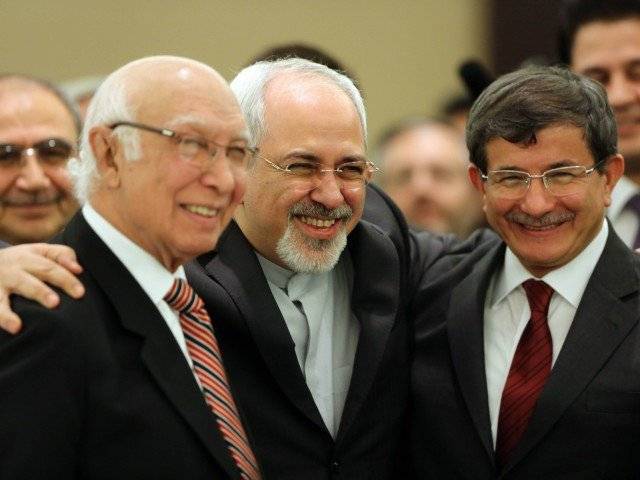After visiting Oman, Iran Foreign Minister Javad Zarif – who also headed successful negotiations between Iran and the so-called P5+1 countries over the former’s controversial nuclear programme – landed in Pakistan on Wednesday for a two-day visit. He has held meetings with Advisor to Prime Minister on Foreign Affairs Sartaj Aziz, COAS General Raheel Sharif and Prime Minister Nawaz Sharif. Mr Zarif’s visit comes at a time when Pakistan is considering whether it should join the Saudi-led GCC coalition and militarily intervene in the Yemen conflict. The joint parliament session convened to debate the issue has presented a clear answer to the question of intervention in Yemen: a clear, unanimous no.
While both Saudi Arabia and Iran – which often employ proxies to undermine each other in the Middle East and beyond and to enhance their influence – the conflict in Yemen is not inherently sectarian. It is Yemen’s internal problem, which may have been exacerbated by foreign involvement, but remains a decades old domestic issue. However, it is being presented and perceived as a sectarian conflict across the Arab world and elsewhere, which is one of the many reasons that make it crucial for Pakistan to avoid intervention on behest of one group or the other.
While addressing a press conference with FM Zarif following their meeting, Sartaj Aziz said, “There is a broad consensus in the Parliament that Pakistan’s involvement in the civil war in Yemen is not advisable.” It seems that the government is acting sensibly and with caution but until its decision is clearly conveyed to the KSA, the ongoing speculation and anxiety will not end. With lifting of sanctions on Iran imminent, Pakistan would do well to act in accordance with changing regional dynamics.
Pakistan’s relationship with Saudi Arabia should not have to be sustained by unjustifiable meddling in foreign affairs and opposition to Iran. As neighbours, Iran and Pakistan stand to benefit from cooperation and trade. Iran-Pakistan gas pipeline, which might become a reality considering reports alleging China’s offer to construct it, is just one example. Although it is difficult to see how Turkey, Pakistan and Iran will be able to initiate dialogue between GCC and their opponents – which includes Iran – and bring about a ceasefire and a peaceful settlement in Yemen, it is nevertheless worth the effort and also in line with the sort of role Pakistan ought to be playing with regards to Yemen. It is hoped that Pakistan will not once again compromise on its national interests for short-term benefits, monetary or otherwise.
Thursday, April 18, 2024
Javad Zarif Visits Pakistan

Minister warns bakers over roti prices
April 18, 2024
Rs50m released to PDMA for rains victims
April 18, 2024
‘Matric exams to start today in KP’
April 18, 2024
Minister visits hospitals in Mardan
April 18, 2024
KP to destroy poppy crop in April 17-30 drive
April 18, 2024
Hepatitis Challenge
April 18, 2024
IMF Predictions
April 18, 2024
Wheat War
April 18, 2024
Rail Revival
April 17, 2024
Addressing Climate Change
April 17, 2024
Justice denied
April 18, 2024
AI dilemmas unveiled
April 18, 2024
Tax tangle
April 18, 2024
Workforce inequality
April 17, 2024
New partnerships
April 17, 2024
ePaper - Nawaiwaqt
Advertisement
Nawaiwaqt Group | Copyright © 2024





